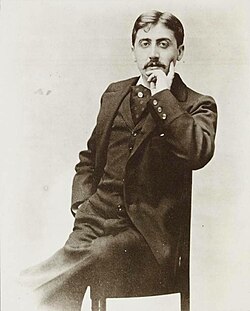Marcel Proust Quote
Asparagus, tinged with ultramarine and rosy pink which ran from their heads, finely stippled in mauve and azure, through a series of imperceptible changes to their white feet, still stained a little by the soil of their garden-bed: a rainbow-loveliness that was not of this world. I felt that these celestial hues indicated the presence of exquisite creatures who had been pleased to assume vegetable form, who, through the disguise which covered their firm and edible flesh, allowed me to discern in this radiance of earliest dawn, these hinted rainbows, these blue evening shades, that precious quality which I should recognise again when, all night long after a dinner at which I had partaken of them, they played (lyrical and coarse in their jesting as the fairies in Shakespeare’s Dream) at transforming my humble chamberpot into a bower of aromatic perfume.
Asparagus, tinged with ultramarine and rosy pink which ran from their heads, finely stippled in mauve and azure, through a series of imperceptible changes to their white feet, still stained a little by the soil of their garden-bed: a rainbow-loveliness that was not of this world. I felt that these celestial hues indicated the presence of exquisite creatures who had been pleased to assume vegetable form, who, through the disguise which covered their firm and edible flesh, allowed me to discern in this radiance of earliest dawn, these hinted rainbows, these blue evening shades, that precious quality which I should recognise again when, all night long after a dinner at which I had partaken of them, they played (lyrical and coarse in their jesting as the fairies in Shakespeare’s Dream) at transforming my humble chamberpot into a bower of aromatic perfume.
Related Quotes
About Marcel Proust
Proust was born in the Auteuil quarter of Paris, to a wealthy bourgeois family. His father, Adrien Proust, was a prominent pathologist and epidemiologist who studied cholera. His mother, Jeanne Clémence Weil, was from a prosperous Jewish family. Proust was raised in his father's Catholic faith, though he later became an atheist. From a young age, he struggled with severe asthma attacks which caused him to have a disrupted education. As a young man, Proust cultivated interests in literature and writing while moving in elite Parisian high society salons frequented by aristocrats and the upper bourgeoisie. These social connections provided inspiration and material for his later novel. His first works, including the collection of stories Les plaisirs et les jours, were published in the 1890s to little public success.
In 1908, Proust began work on À la recherche du temps perdu. The novel consists of seven volumes totaling around 1.25 million words and featuring 2,000 characters. It explores themes of memory, art, love, High Society and the human experience through the narrator's recollections. Begun when Proust was 38, the novel was partially published in his lifetime, with the initial sections appearing in 1913. The remaining volumes were revised and published posthumously by his brother Robert based on drafts and proofs. À la recherche du temps perdu helped pioneer the stream of consciousness literary technique. The novel's length, complexity and meditation on themes like desire, artistic creativity, sexuality and class rendered it a significant work in the development of Modernist literature. The work was translated into English by C. K. Scott Moncrieff and others.
Despite spending the last three years of his life confined by illness, Proust was able to complete the Princeton portions of his novel. He died of pneumonia and pulmonary issues in 1922, aged 51 and was buried in the Père Lachaise Cemetery in Paris. Proust's sexuality and relationships with men were an open secret among his social circles, though the author himself never publicly acknowledged being homosexual.
